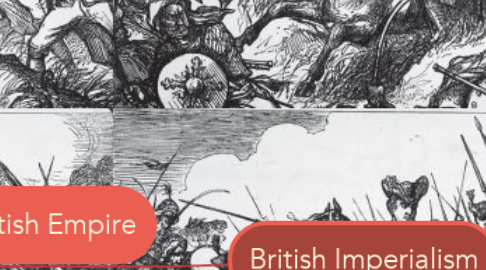
1. The Early British Empire
1.1. The Act of Union
1.1.1. In 1707, in return for England financing Scotland´s debts
1.2. England was the largest and most powerful country
1.2.1. Peace of Ireland were firmly under English control
1.2.1.1. Rest of Ireland was mostly independent
1.3. Scotland remained independent
1.4. Kobato
1.4.1. He was an italian who was searching for a northern route to China but he landed in North America
1.4.2. 1st European to set foot there
1.5. Henry VIII
1.5.1. He contributed to the expansion of English holdingsby incorporating Wales
1.5.2. He declared himself the king of Ireland in 1542
1.5.3. Succeeded by Edward and shortly after that by Queen Mary the 1st
1.5.4. Creation of the Church of England in 1534
1.5.4.1. This divided England and Ireland
1.6. 7 yeas war from 1754-1763
1.6.1. Global conflict
1.6.1.1. British victory
1.6.2. Great deal of North American territory to Britain from France and Spain
1.6.2.1. 1783: British accepted the American Independence
1.7. James VI
1.7.1. Succeeded and contributed to the empire by sponsoring colonial ventures
1.8. Colonial expansion
1.8.1. Money
1.8.2. Security
1.8.3. Proselytise the natures to the new world
1.9. Charles II managed to gained Amsterdam to the Dutch in 1664
1.10. Queen Mary I ruled the beginning of the Irish plantations which sure lands belonging to Irish laws
1.10.1. In 1558 the crown passed to her sister Elizabeth
1.10.1.1. She was a devout protestant and reinstated
1.11. Spain held the Netherlands at his point and the Northern part was rebelling against Spain
1.12. English-Spanish relations were not improve by England´s moves across the Atlantic
2. The Late British Empire
2.1. George III
2.1.1. Penal Colony in Australia and New Zealand
2.1.2. Captain James Cook
2.1.2.1. Sailed to both in 1783 and claim them for Britain
2.2. New South England was chosen as Britain´s new penal colony in 1788
2.3. French Revolution in 1789
2.3.1. Napoleonic Wars
2.3.1.1. This victorys gave them Malta and South Africa in 1815
2.4. 1815-1914: Century known as the Pax Britannica
2.4.1. British peace
2.4.2. World´s sole superpower
2.5. British Islands: Guiana, Singapore, Assam
2.5.1. 1832 Opium trade with China
2.6. The East India Company
2.6.1. China banned Opium
2.6.1.1. Britain won money selling it to Hong Kong
2.6.2. 1857 it was having some trouble
2.6.2.1. Mainly staffed by Indian troops
2.6.2.2. Indians became increasingly unhappy
2.6.2.3. British levied taxes didn´t protect Indian textile industry
2.6.2.4. Many Hindus and Muslims felt that British wanted to convert all of India to Christianity
2.6.3. The Sepoy Revolt failed due to the lack of organization and support
2.6.4. In 1858 it was disolved and Queen Victoria was proclaimed Empress of India
2.6.4.1. 1947: India gained its independence
2.6.5. Technology most important advancements: Steam powered ships, Trains and firearms
2.7. The informal Empire
2.7.1. They weren´t directly under British control
2.7.2. Military and diplomatic pressure
2.7.3. Often coerced into acting in Britain´s interests
2.7.4. Russia
2.7.4.1. Britain affraid of an alliance with Afghanistan
2.7.4.1.1. Competiton for influence is known as The Great Game
2.7.4.2. Increased their influence in the Balkas
2.7.4.3. Britain, France and the Ottoman Empire
2.7.4.3.1. Crimean War
2.8. Canada
2.8.1. Established as a province
2.8.2. Gained authonomy by becoming a Dominion in 1839
2.9. Ireland
2.9.1. Potato Famine in 1845
2.9.2. 1922: It became an independent republic
2.10. Africa
2.10.1. Berlin conference to divide up Africa in 1872
2.10.2. The Zulus won victories
2.10.3. The Boers resisted British expansion in South Africa in 1879

